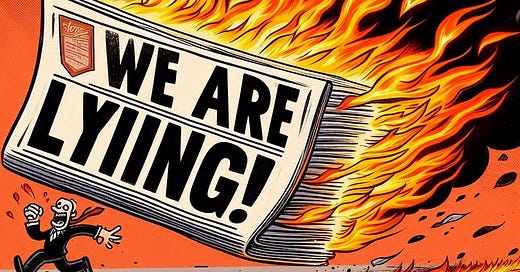The (Possibly Beneficial) End of Trust in Institutions
The chasm between talk and actions by the nation’s political class has become increasingly obvious, despite the refusal of the corporate press to call them to account.
As a political and constitutional matter, President Joe Biden’s decision to step down from the Democratic Party presidential nomination is entirely up to him, if in fact he did make that decision himself, as we are obliged to assume in the absence of any direct evidence otherwise. Similarly, Biden’s decision to endorse Vice President Kamala Harris is fully within his rights, with the same proviso.
These decisions, however, make mincemeat of the claims by Biden and the Democrats that they are the valiant defenders of democracy in the United States and that former president and current Republican nominee Donald Trump is a unique and deadly threat to that same principle. (They have been using the word existential to convey the thought of Trump as murderous while maintaining deniability on their part. That is neither honorable nor justifiable, especially in light of the mighty odd coincidence of their years-long campaign having culminated in an assassination attempt, purely by chance, of course.)
The incoherence of claiming a passion for the defense of democracy while casting aside the votes of all the people across the country who took the trouble to renominate Biden through the primary elections is flagrant and indeed brazen. The people who run the Democrat Party made a political calculation that Biden would do them more damage by running than by dropping out, and it is obvious that they forced him out for venal political reasons. Respect for democracy certainly did not affect their considerations at all.
On top of all that, with Harris already trailing Trump in presidential preference polls, the political machinations behind the Democratic ticket may not be over yet.
Meanwhile, Republicans have spent the entire twenty-first century conservatively promising to fight the advance of the Left—seldom presenting a positive agenda of their own—and consistently backing down as soon as any real fight began, if not earlier.
This chasm between talk and actions by the nation’s political class has become increasingly obvious, and not because the corporate press has held them to account, especially as regards the Democrats, but also in the countless cases of GOP capitulation to the opposing party’s agenda in the face of the obvious wishes of the Republican Party’s voters.
The corporate media have long been doing the very opposite of their supposed role of holding politicians accountable, instead hiding the truth and propagating lies while leading a censorship regime coordinated with the activist Left of the nation’s political sector plus a vanguard class of international elites. The exposure of Biden’s incapacity during the June 27 debate destroyed any remaining illusion that the corporate press has been doing its job.
On the contrary, the exposure of both parties’ offenses against their voters has been accomplished largely by independent journalists self-publishing through small, scantily funded web outlets, through the X social media platform, and via newsletters such as this one. Consequently, just as the nation’s political parties have lost their credibility, so have the political press and the corporate media.
On balance, the destruction of trust in these institutions is a positive development. Yes, it makes it more difficult for the political and cultural classes to lead. However, it has likewise made it more difficult for the political and cultural classes to lead the people to their destruction. That may prove to be a major unexpected benefit of the rampant political mendacity of this era.
Of course, nothing will change for the better until the people who have been so regularly betrayed by these scoundrels remove them from power. This is where leadership from alternative media may prove crucial.




